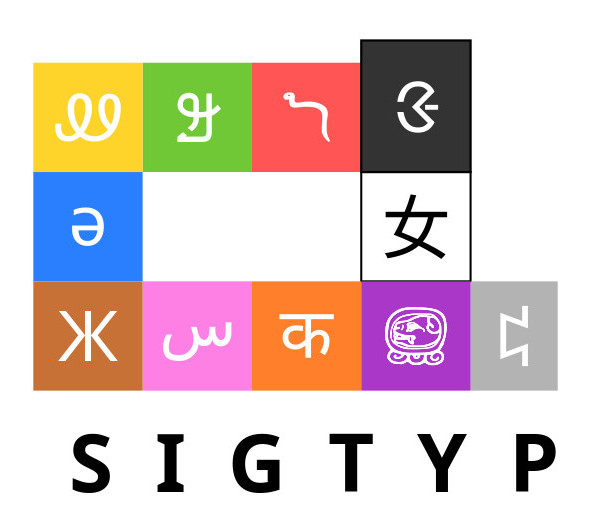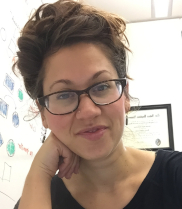March, 29 • Rabat, Morocco
at EACL2026
Important Dates (all deadlines are 23:59 AoE)
— December 19, 2025 January 9, 2026: Direct paper submission deadline
— January 2, 2026 January 9, 2026: Pre-reviewed (ARR) submission deadline
— January 23, 2026 January 30, 2026: Notification of acceptance
— February 3, 2026 February 10, 2026: Camera-ready deadline
— March 24 or 29, 2026: Workshop
Keynote Speakers
The aim of the 8th edition of SIGTYP workshop is to act as a platform and a forum for the exchange of information between typology-related research, multilingual NLP, and other research areas that can lead to the development of truly multilingual NLP methods. The workshop is specifically aimed at raising awareness of linguistic typology and its potential in supporting and widening the global reach of multilingual NLP, as well as at introducing computational approaches to linguistic typology. It will foster research and discussion on open problems, not only within the active community working on cross- and multilingual NLP but also inviting input from leading researchers in linguistic typology. Our workshop will serve as a platform to enable fruitful discussions. In 2026, we place a special emphasis on the utility of LLMs for typological research.
SIGTYP is the first dedicated venue for typology-related research and its integration in multilingual NLP. Appropriate topics include (but are not limited to) the following as they relate to the areas of the workshop: :
• Integration of typological features in language transfer and joint multilingual learning. In addition to established techniques such as “selective sharing”, are there alternative ways to encoding heterogeneous external knowledge in machine learning algorithms?
• Development of unified taxonomy and resources. Building universal databases and models to facilitate understanding and processing of diverse languages.
• Automatic inference of typological features. The pros and cons of existing techniques (e.g. heuristics derived from morphosyntactic annotation, propagation from features of other languages, supervised Bayesian and neural models) and discussion on emerging ones.
• Typology and interpretability. The use of typological knowledge for interpretation of hidden representations of multilingual neural models, multilingual data generation and selection, and typological annotation of texts.
• Improvement and completion of typological databases. Combining linguistic knowledge and automatic data-driven methods towards the joint goal of improving the knowledge on cross-linguistic variation and universals.
• Linguistic diversity and universals. Challenges of cross-lingual annotation. Which linguistic phenomena or categories should be considered universal? How should they be annotated?
• Using LLMs for typological studies. Can LLMs be utilised to formulate or prove typological hypotheses? Are they capable of making useful cross-linguistic generalisations?
• Extra topics. Generation of constructed languages, universals in diachronic languages changes, information-theoretic approaches to typology, automated approaches to etymology.
Submissions
We invite both extended abstract submissions (non-archival) and general paper submissions (archival). The accepted submissions will be presented at the workshop, providing new insights and ideas. Extended abstracts should describe already published work or work in progress and should not exceed two (2) pages. This way, we will not discourage researchers from preferring main conference proceedings, at the same time ensuring that interesting and thought-provoking research is presented at the workshop. For general (archival) submissions we accept both long and short papers. Short papers should not exceed four (4) pages, long papers should not exceed eight (8) pages papers. Unlimited additional pages are allowed for the references section in all submission types.
Submissions should be anonymous, without authors or an acknowledgement section; self-citations should appear in third person. The reviewing process will be double-blind.
Submissions should follow the ACL 2026 style guidelines:
https://github.com/acl-org/acl-style-files; both long and short paper submissions must follow the two-column format of ACL proceedings. All submissions must be in PDF format.
These should be submitted via OpenReview:
https://openreview.net/group?id=eacl.org/EACL/2026/Workshop/SIGTYP
ARR submissions that were rejected or withdrawn from EACL can be submitted to SIGTYP by January 9, 2026. Acceptance decisions will be made based on the existing ARR reviews. Authors will be notified by January 23, 2026. In order to submit the paper, please send the reviews and paper PDFs along with the main contact email to vylomovae AT unimelb.edu.au CCing priya.rani AT insight-centre.org
We also invite papers accepted to appear in Findings. If you'd like to present your work at SIGTYP, please send us an email attaching the paper by January 19, 2026. Acceptance decisions will be made based on its relevance to SIGTYP topics. Authors will be notified by January 23, 2026. Email us via vylomovae AT unimelb.edu.au CCing priya.rani AT insight-centre.org
Program Committee
Barend Beekhuizen, University of Toronto
Edoardo Ponti, University of Edinburgh
Aso Mahmudi, University of Melbourne
Andreas Shcherbakov, CTI
Michael Hahn, Universität des Saarlandes
Oleg Serikov, KAUST
Borja Herce, UZH
Giuseppe G. A. Celano, Universität Leipzig
Kemal Kurniawan, University of Melbourne
Elisabetta Jezek, University of Pavia
Ritesh Kumar, Dr. Bhimrao Ambedkar University
Jinrui Yang, University of Melbourne
Priya Rani, Panlingua Language Processing LLP
Richard Sproat, Sakana AI
Raphael Merx, University of Melbourne
Ryan D Cotterell, ETH Zurich
Rena Wei Gao, University of Melbourne
Ekaterina Vylomova, University of Melbourne
Alexey Sorokin, Lomonosov Moscow State University
Dolores Jiménez López, Universitat Rovira i Virgili
Claire Bowern, Yale University
Emily Ahn, University of Washington
Organizers
| Priya Rani | Alexey Sorokin | Ritesh Kumar | Andreas Shcherbakov |
|---|---|---|---|
| Oleg Serikov | Michael Hahn | ||
| Edoardo M. Ponti | Ryan Cotterell | Ekaterina Vylomova |
Sponsors
Interested in being a Sponsor? Contact us!


